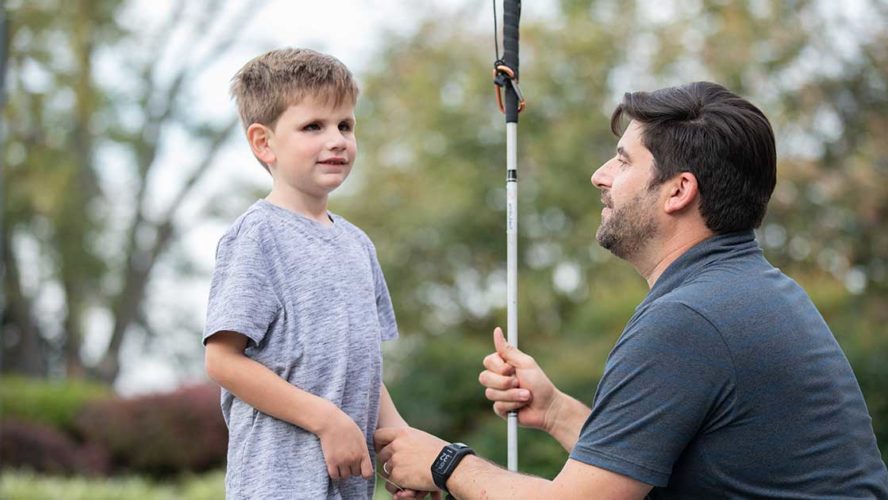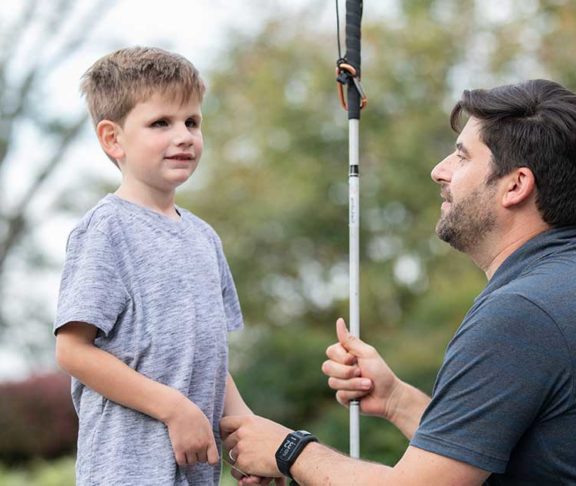The diagnosis of progressive vision loss from a retinal degenerative disease like age-related macular degeneration (AMD), retinitis pigmentosa, Stargardt disease, or Usher syndrome can be incredibly difficult for patients and their families.
But there is hope and a path forward for those affected.

Ben Shaberman
VP, Science Communications, Foundation Fighting Blindness
We usually don’t think about our retinas unless something goes wrong and we lose vision. Our retinas are thin layers of powerful neural tissue lining the back of our eyes. They capture light, like film or digital sensors in a camera, to create the images we see. When the light-sensing cells of the retina degenerate, the resulting vision loss or blindness can be devastating. People can lose the ability to read, drive, and see the faces of their loved ones.
The Foundation Fighting Blindness is the global leader in driving research for treatments and cures for retinal degenerative conditions, providing knowledge, community, and hope to more than 10 million people affected in the United States and millions more worldwide. Since its inception in 1971, the Foundation has raised nearly $900 million toward its urgent mission.
Thanks to Foundation funding, we now have an FDA-approved gene therapy, LUXTURNA®, which has restored vision to children and young adults who were virtually blind from a form of Leber congenital amaurosis, a severe retinal disease. The innovative treatment has enabled many of these patients to put away their navigational canes, see the faces of their parents, and even see stars in the sky for the first time.
Today, more than 45 clinical trials are underway for emerging gene therapies, cellular treatments, and small molecules. The Foundation has funded 88% of the current therapies in these human studies.
The Foundation’s website, www.FightingBlindness.org, is chock full of information on these clinical trials, retinal diseases, educational seminars, support resources, and the more than 80 projects funded by the Foundation for cutting-edge research throughout the world.
The Foundation’s network of more than 45 active chapters throughout the United States enables patients and families to connect with each other for support and social engagement. Chapters host social and educational events throughout the year, connecting researchers and physicians with patients and families. The Foundation also provides resources for eye care professionals to help them educate and serve their patients.
“The Foundation is proud of its leadership in driving research for treatments and cures, and advancing promising therapies into clinical trials,” said Jason Menzo, the Foundation’s chief executive officer. “We are also very proud of the strong, vibrant community we’ve built. No one ever has to be alone when facing a challenging retinal condition.”
In 2015, the Foundation launched its My Retina Tracker® Registry to connect researchers and companies conducting clinical trials with patients. Available at www.MyRetinaTracker.org, the registry is patient-controlled — that is, patients create and maintain the records. The registry is secure, menu-driven, and accessible for people with low vision, including those who use screen readers. Patients’ privacy is always protected; personal information is never shared. Patients are notified about clinical trials that may be appropriate for them, and the patient contacts the researcher if they’re interested in participating in the study. More than 24,000 people are registered in My Retina Tracker Registry.
The Foundation also provides no-cost genetic testing for patients diagnosed with an inherited retinal disease, such as retinitis pigmentosa, Stargardt disease, or Usher syndrome. By identifying the defective gene causing the condition, patients and families can: 1) get a clearer diagnosis, 2) determine which family members may be at risk of the disease, and 3) understand which trials and emerging therapies might be right for them.
Physicians order the My Retina Tracker genetic test at www.BlueprintGenetics.com (make sure the “My Retina Tracker panel” is ordered from the list of tests). No-cost genetic counseling is also provided through the program to help patients and families understand the test results and a path forward. More than 18,000 patients have ordered genetic testing through the no-cost program.
Click here to donate and support Foundation Fighting Blindness’ mission.


